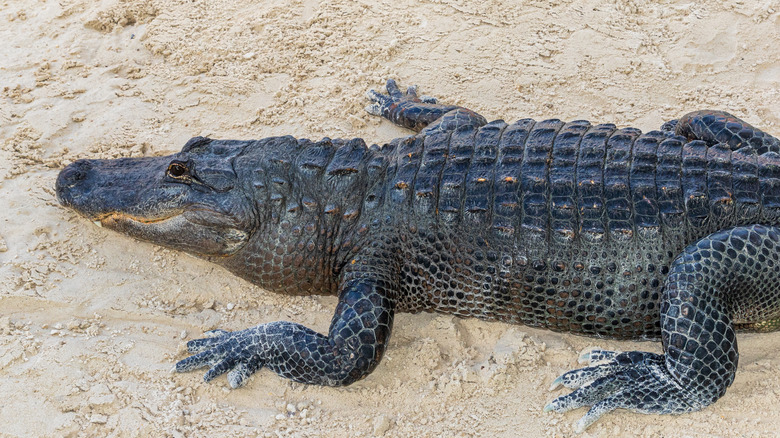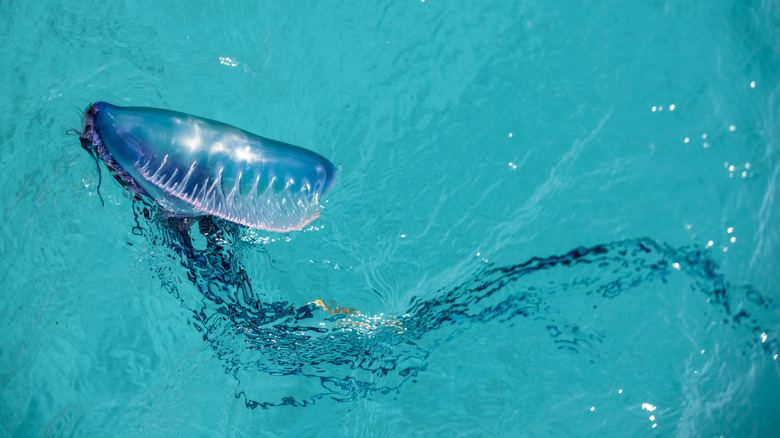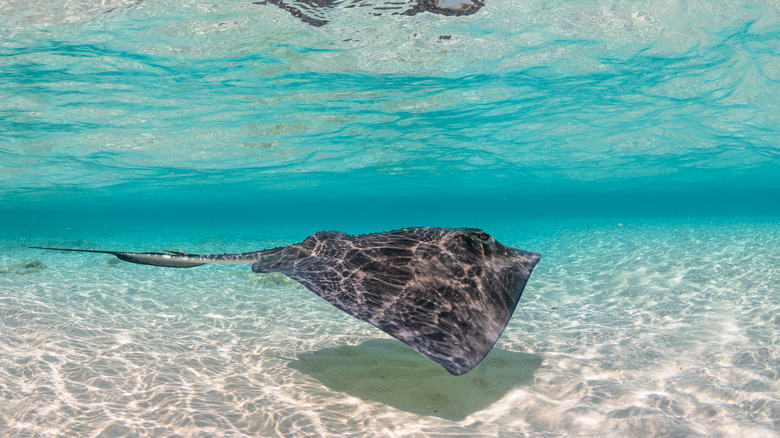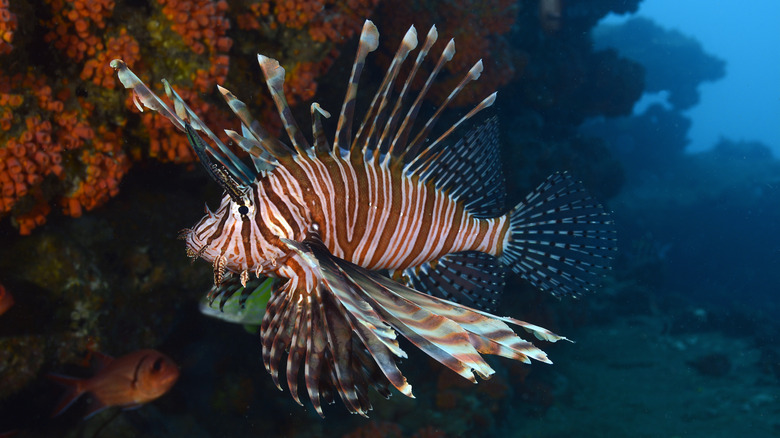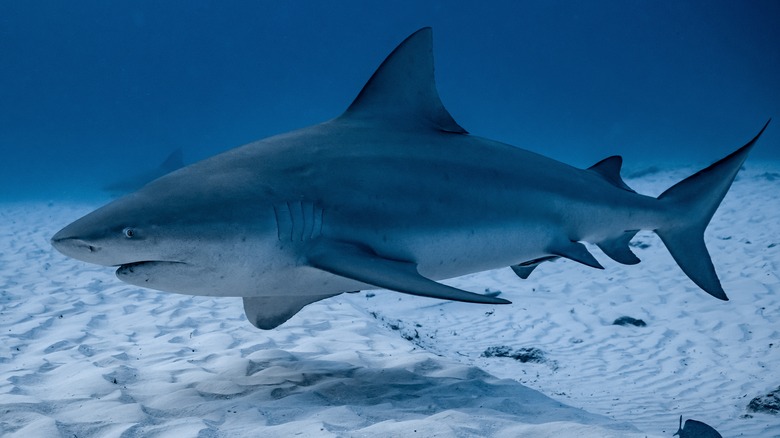5 Creatures To Beware Of When Adventuring On The Gulf Coast
Five southern states border the Gulf of Mexico. Their coastal shorelines combine to make up the American Gulf Coast, which stretches around 1,700 miles from the mouth of the Rio Grande River in Brownsville, Texas to the Dry Tortugas National Park west of Key West, Florida. Between Texas and Florida are sandwiched the remaining Gulf Coast states — Louisiana, Mississippi, and Alabama. The region is home to a wide array of beaches, estuaries, wetlands, and bays. All told, over 17,000 miles of shoreline wraps around the water bodies in this region. Within those waters lives an extremely diverse array of marine life. Unfortunately, some species found in these diverse beaches, bays, and estuaries pose dangers ranging from minimal to life-threatening. As a result, while the waters of the Third Coast are popular for a variety of outdoor activities, there are a number of creatures to beware of when adventuring on the Gulf Coast.
Alligators can surprise beach visitors
Most people know alligators pose a risk to humans. However, they aren't just found in swamps or rivers or lakes — you can also spot them in many estuaries and bays along the Gulf Coast. They even make the occasional appearance on Gulf beaches. Alligators inhabit every one of the five Gulf Coast states. In fact, many of the waterways along the Gulf Coast are considered alligator-infested waters and the Everglades, which border the Gulf of Mexico in South Florida, are the only place in the U.S. you can see both gators and crocodiles in one place. While they have been known to pop up on beaches from Texas to Florida, this most often occurs during the mating season, which lasts from mid-spring through early summer in most Gulf states. However, it is possible to encounter gators in the coastal marshes, estuaries, and bay systems year-round, so swimmers, fishermen, and hunters in these areas should be well aware of possible alligator encounters.
Whenever adventuring in alligator territory, be very aware of your surroundings, especially near the water's edge, as that is where gators like to lie in wait. Additionally, if you hear a loud hissing coming from tall grass along the shoreline, that is likely a gator giving you a warning to stay back. If you do see gators lazing on the bank, give them a wide berth. If a gator begins approaching, calmly leave the area immediately and alert wildlife officials.
Jellyfish and Man o' War tout stinging tentacles
Jellyfish are a well-known nemesis for beachgoers on every coast, so it is always important to know what to do if stung by a jellyfish. The Gulf Coast is no different. There are numerous types of dangerous jellyfish, and the Gulf Coast is home to a handful of them, including the cannonball jelly, moon jellyfish, sea nettle, and pink meanie, as well as the Portuguese Man o' War, which isn't technically a jelly but does have long, stinging tentacles. The presence of each of these species varies by season, but every month of the year sees one or more of them is found in high numbers along the Gulf Coast.
While jellies can swim, they aren't known for their speed or agility. So, they are typically easy to avoid if seen ahead of time. In clearer water, this is simple enough. However, in rough or muddy water, they can be difficult to spot -– except for the Man o' War, which floats on top of the water like a bright blue float with it's stinging tentacles trailing down current. With that in mind, the best way to avoid being stung if you do see any jelly is to stay up current, a it's tentacles will be dragging behind it, down current.
Stingrays can deliver painful punctures
The inshore and beachfront waters of the Gulf Coast are home to a menagerie of rays and skates. Not all of them are dangerous. However, there are three common stingrays found in the region — the Atlantic, Southern, and Bluntnose stingray. Each of these is capable of delivering a painful and potentially dangerous injury to anyone unlucky enough to land on one. So, if you're spending time in the water along the Gulf Coast, it's important to know what to do if you're stung by a stingray.
Actually, despite their name, it is somewhat of a misnomer –- and understatement -– to say stingrays sting. Stingrays use a spiny barb located at the base, not tip, of their take to puncture and deliver venom. This a defensive maneuver on stingray's behalf. People most often get stuck by a stingray when they inadvertently step on them, as rays have a tendency to bury themselves beneath a layer of sand in shallow water and can be difficult to see. While stepping on them is the most common way to draw a defensive strike from a ray, at times beachgoers may also rollover or land on them while playing in shallow water. The best way to avoid being stabbed by one is to shuffle your feet along the bottom. This will alert the ray to your presence and prevent you from stepping on top of it. More often than not, if a stingray is bumped, it will swim away without incident.
Lionfish are beautiful but dangerous
One dangerous species found in the Gulf shouldn't even be living here. Lionfish are an invasive species most likely introduced to the Gulf of Mexico after being released by aquarium owners. As illustrated by the National Oceanic and Atmospheric Administration's Invasive Lionfish Portal, these aggressive predatory fish have gained a foothold in both the Atlantic Ocean and Gulf of Mexico along the U.S. coast after being introduced from their native waters on the western side of the Pacific Ocean. Additionally, they are found in inshore, nearshore, and offshore waters of widely varied depths throughout the Gulf Coast region.
Lionfish have thrived in the Gulf since their introduction largely because they are prolific spawners and have no natural predators in these waters. Any fish that does attempt to prey on lionfish quickly finds out these stunning swimmers have a lethal defense mechanism in the form of 18 venomous spines. This same defense mechanism can be turned on people who attempt to touch them. So, if you do happen to come across a lionfish while swimming, snorkeling, or diving, take a hands-off approach and just view this interesting-looking invasive species from afar. If you happen to catch one while fishing, use thick gloves when handling to avoid getting injected with their potent venom. As an aside, lionfish are considered excellent table fare. Fishermen and divers are encouraged to harvest them as a way to control the population, although they must be handled properly.
Sharks strike fear in beachgoers
When it comes to dangerous coastal creatures, nothing captures the imagination quite like sharks. Nearly 50 species of shark consider the waters of the Gulf of Mexico home. Several of the most dangerous types of sharks are found here, including the shortfin mako, lemon, spinner, hammerhead, blacktip, thresher, sand tiger, and tiger. However, along the Gulf Coast, the bull shark is the most feared among beachgoers and fishermen.
Despite having nearly a dozen seriously dangerous shark species swimming in the shallow beachfront and inshore waters, shark attacks are still relatively rare. However, they do happen. In fact, there have been a number of sensational shark attacks along the Gulf Coast in recent years, including the infamous spree of four attacks in two hours on South Padre Island on the July 4th, 2024. To that end, it is everyone's responsibility to know how to best avoid a shark attack and how to survive if attacked by a shark.
To decrease odds of being attacked by a shark, you should follow what are roundly considered universal precautions for shark safety. These include not swimming alone, around schools of fish, or near where people are fishing. You should also avoid the water during the lowlight periods of day and not wear flashy jewelry in the water. If you are attacked, you should fight back with all you have, exit the water as quickly as possible, keep pressure on the wound, and seek medical attention immediately.

